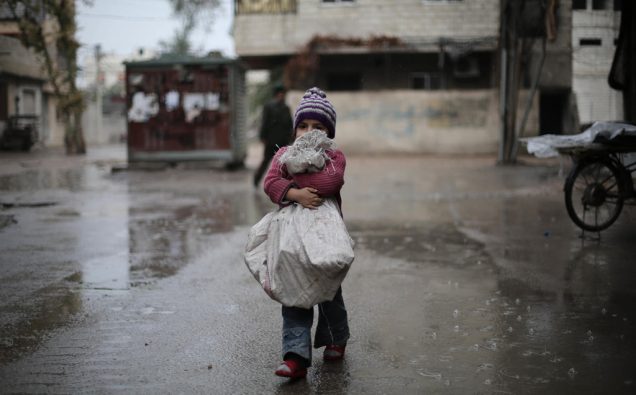
A child carries a bag of firewood she bought for her family in besieged east Ghouta, Syria. Photo: UNICEF/Al Shami
As head of the world’s top diplomatic forum, United Nations Secretary-General Antonio Guterres, warned against excessive nationalism and xenophobia while issuing a red alert for world peace on the eve of 2018.
“On New Year’s Day 2018, I am not issuing an appeal. I am issuing an alert – a red alert for our world,” the Secretary-General said, as the world faced conflicts, hunger, climatic disasters, dangerous trends of fear of the other, rivalries among major powers and shrinking natural wealth.
“As we begin 2018, I call for unity. […] We can settle conflicts, overcome hatred and defend shared values. But we can only do that together,” he added.
Syria, Iraq, Yemen, Afghanistan, Sudan, Kashmir, Palestine. The list of festering conflicts, often involving multiple parties, goes on and on. The world has the biggest number of refugees since the WWII and the Syrian conflict is longer now than WWII. There have been unprecedented droughts. Nationalists and localists in several Western countries are deadly opposed to global togetherness and sharing the burden of refugees. The poverty is rampant. The digital divide is growing. The world’s problems have never been so many and so diverse.
While Guterres’ call reflects his desire as the chief of the world body – tasked with ensuring peace around the globe – it’s unclear if and how many world leaders, particularly in the powerful capitals – would sign on to his peace mission.
Will the 2017 – a year of broken alliances, regional animosities and growing threats of group and state terror – serve as a reminder for the world?
In Myanmar, the Ronhingya faced persecution, Palestinians and Kashmiris continued to suffer under occupational forces.
Despite individual successes by rights activists, the state of human rights remained dismal in much of the world, especially conflict-hit countries.
2018: Keep working for a world where girls can choose their own future.
— Malala Yousafzai (@Malala) December 31, 2017
The UN chief noted with concern the devastating implications of the conflicts and animosities that 2017 produced.
Recalling that last year he urged that 2017 be a year for peace, the UN chief noted that unfortunately – in fundamental ways, the world went in reverse.
Perils, including deepening conflicts and new dangers emerged, and global concerns over nuclear weapons reached the highest since the Cold War, he said.
At the same time, impacts of climate change worsened at an alarming rate, inequalities grew and there were horrific violations of human rights.
“Nationalism and xenophobia are on the rise,” Guterres noted.
Yet, the world’s ace diplomat said that the world can be made more safe and secure, conflicts can be settled, hatred can be overcome and shared values defended.
But he emphasized that unity is indispensable to achieving these goals.
“Unity is the path. Our future depends on it,” the Secretary-General said, while urging leaders everywhere to resolve in the New Year to: “Narrow the gaps. Bridge the divides. Rebuild trust by bringing people together around common goals.”












